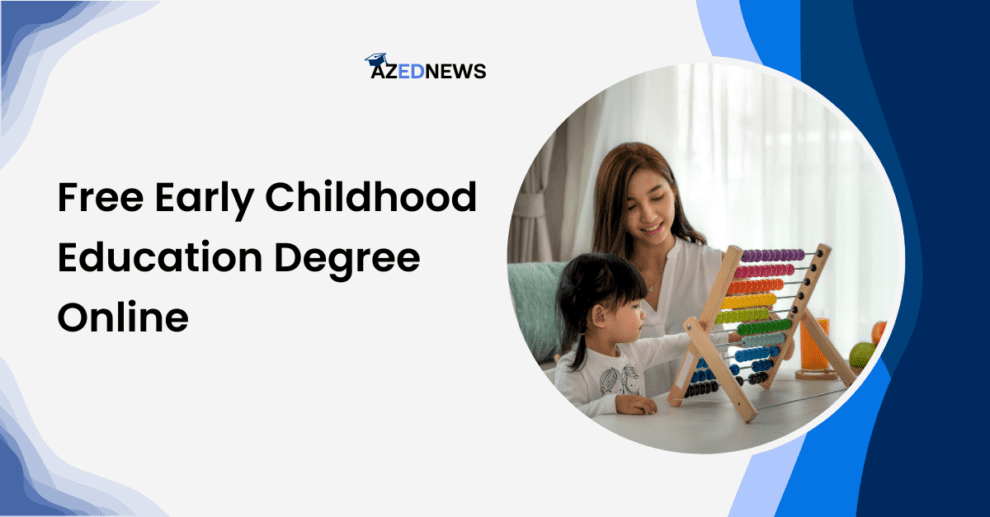Are you seeking a free early childhood education degree online? Ideal for aspiring educators, parents, and budget-conscious career changers, these programs offer affordability and flexibility. You are in the right place.
Table of Contents
Early childhood education (ECE) began several centuries ago, setting the groundwork for educating young children. It significantly contributed to the evolution of modern child development practices. Central to its philosophy is the emphasis on play and individual interests, principles that continue to shape contemporary educational approaches.
In the present day, early childhood education prioritizes the holistic development of children, focusing on their social, behavioral, and cognitive growth. While traditional classroom settings remain pivotal, modern ECE environments offer comprehensive learning experiences that encourage exploration, skill-building, and relationship-building among peers and adults.
If you want a rewarding career helping kids grow and thrive, consider getting an online bachelor’s degree in early childhood education. In these programs, you’ll learn about children’s behavior and development, understanding their different needs as they grow. It’s a promising path for those who love working with young learners.
By earning a free early childhood education degree online, aspiring educators and advocates can contribute significantly to this vital and impactful field, shaping the future of education and nurturing the potential of every child. There are free courses available for Early Childhood Education you can check out our detailed article on Free Online Early Childhood Education Courses.
What is Early Childhood education?
Children gain knowledge, behaviors, and skills through early experiences. Child development studies changes in motor, physical, cognitive, social, emotional, communicative, and adaptive skills.
Several levels monitor behavior. Each stage has milestones that are closely tracked to evaluate development aspects. These findings assist researchers in understanding how child care, parenting features, poverty, and early childhood education affect children. This research can inform childhood education and mental health therapy and assist children overcome developmental barriers.
Professionals with scientific backgrounds may study child development because of its importance. However, numerous factors affect child development. Knowledge of this field can help educators, social workers, and lawyers.
Top 10 free early childhood education degree online
1. University of North Carolina at Greensboro
- Tuition: $5,436/year (in-state)
- Application Fee: $65
This university offers the Bachelor of Science in Human Development and Family Studies. The students require 120 credits to get the degree and an in-person field placement after completion of the program.
Pros:
- High student retention rate
- High socioeconomic diversity
- Do not use Common App
Cons:
- The graduation rate among Pell Grant recipients is lower compared to that of all students.
2. University of Washington
- Tuition: $231/credit
- Application Fee: $80
This Degree-completion program offers a Bachelor of Arts in Early Care and Education. It takes at least seven quarters for full-time students to get the degree. The students require completion of 45 credits at an accredited school. It emphasizes research, observation, and hands-on planning. Includes community-based learning.
Pros:
- High student retention rate
- High graduation rate
- High median earnings among graduates
Cons:
- High student-to-faculty ratio
- Low socioeconomic diversity
3. Florida International University

- Tuition: $229/credit (in-state)
- Application Fee: $30
The University offers a Bachelor of Science in Early Childhood Education where 120 credits are required for a non-licensure program. The course allows the students to get high-paying jobs in schools and other childhood education facilities.
Pros:
- Low Average Annual Net Price
- High Student Retention Rate
- High Graduation Rate
- A large number of students have placed their federal student loans on hold
Cons:
- High student-to-faculty ratio
4. Ball State University
- Tuition: $4,217/semester (in-state)
- Application Fee: $60
It offers a Non-licensure early childhood education degree. To complete the program students require 45 credits. The course is focused on childhood development and parent-child relationships.
Pros:
- Minimal students with federal student loans
- Strong student retention rate
- Low student-to-faculty ratio
Cons:
- The average yearly cost is high after financial aid.
- Fewer Pell Grant recipients graduate compared to all students.
5. Mercy College
- Tuition: $11,053/term (undergraduate)
- Application Fee: $40
The college offers Behavioral Science and Early Childhood Education degrees. It is available online with in-person student teaching for students within 60 miles of Dobbs Ferry, New York. There are options for simultaneous bachelor’s and master’s degrees.
Pros:
- Graduates have a high median federal student loan debt.
- The school has a strong student retention rate.
- There is a high level of socioeconomic diversity.
Cons:
- Many students have federal student loans on hold.
- Pell Grant recipients graduate less compared to all students.
6. East Carolina University
- Tuition: $4,073/term (in-state)
- Application Fee: $75
The university offers a Bachelor of Science in Birth-Kindergarten Teacher Education. It includes hands-on experience in local schools and developmental centers.
Pros:
- High graduation rate
- Uses Common App
- High student retention rate
- High percentage of students with federal student loans
Cons:
- High percentage of students in federal student loan deferment
7. Chaminade University of Honolulu
- Tuition: $585/credit
- Application Fee: $50
Chaminade University of Honolulu is an Early Childhood Education program with the requirement of 120 credits to get the degree. It requires prerequisites in child development and family issues. The expertise includes student teaching experiences and fieldwork seminars.
Pros:
- High student retention rate
- Low student-to-faculty ratio
- High socioeconomic diversity
Cons:
- High average annual net price
- Low graduation rate
8. Eastern Oregon University

- Tuition: $286/credit (in-state)
- Application Fee: $50
ECE degree allows the transfer of up to 135 credits for students and Includes two in-person practicums. The course covers child development and teaching skills.
Pros:
- High socioeconomic diversity
- Low percentage of students with federal student loans
- Uses Common App
Cons:
- Low graduation rate
- High percentage of students with federal student loans
9. University of Michigan-Flint
- Tuition: $516/credit (in-state)
- Application Fee: $75
The university offers a Bachelor of Science in Early Childhood Studies focusing on child development and learning from birth through age 8. It includes field experiences and minors in mathematics or language arts.
Pros:
- High student retention rate
- Low student-to-faculty ratio
- Uses Common App
Cons:
- High percentage of students with federal student loans
- Low graduation rate
10. National Louis University

- Tuition: $11,505/year
- Application Fee: None
The university offers a BA in Early Childhood and Elementary Education, a BA in Early Childhood Education, and a competency-based BA in Early Childhood Education. Prepares educators for children from birth through second grade.
Pros:
- High socioeconomic diversity
- Accelerated option for working educators
- Low percentage of students with federal student loans
Cons:
- High average annual net price
- Low graduation rate
Top 9 Free Online Early Childhood Education Courses
1. Understanding Trauma-Informed Care in Childcare Settings
ProSolutions Training offers a thorough childcare training course that focuses on trauma-informed care within the context of the Pyramid model. Participants explore the use of trauma-informed strategies in various childcare settings.
- Course Duration: 5 hours.
- Certification: Free certificate of completion and 0.50 continuing education credits.
2. Identifying and Addressing Child Abuse: A Guide for Educators
ProSolutions Training provides an essential childcare training course that prepares educators to recognize and report suspected incidents of child abuse. The seminar emphasizes the need to recognize at-risk youngsters and provide secure environments.
Course Duration: 2 hours.
Certification: Free certificate of accomplishment and 0.20 continuing education credits.
3. Classroom WISE: Wellbeing Strategies for Educators
Classroom WISE is a collaboration between the Mental Health Technology Transfer Centre Network and the National Centre for School Mental Health. This self-paced training effort provides K-12 educators with practical insights and practices for enhancing student well-being.
- Course Duration: 5 hours.
- Certification: A free certificate of completion.
4. Obesity Prevention Training: Promotion of Physical Activity in Early Childhood
Bright Futures presents “One Step at a Time,” an entertaining online course designed to help childcare providers promote physical exercise among young children. Educators can discover effective ways to promote healthy lives through interactive modules.
- Course Duration: 1hour.
- Certification: Free certificate of completion; one continuing education hour is provided.
5. Pediatric first aid: essential skills for educators
First Aid for Free is a complete pediatric first aid training designed for childcare educators. This training, which covers lifesaving techniques and common medical illnesses, provides educators with critical skills for efficiently responding to crises.
- Course Duration: Self-paced.
- Certification: A free certificate of completion will be issued following satisfactory completion of the course.
6. Look at me! Monitoring Child Development Milestones
The Centers for Disease Control and Prevention (CDC) offers a useful training course for early childhood educators aimed at tracking children’s developmental milestones. Educators learn the value of developmental monitoring and efficient communication with parents.
- Certification: A free certificate of completion will be issued upon passing the post-test evaluation.
7. Increasing Social and Emotional Competence in Children
ProSolutions Training provides a specialized childcare training course that emphasizes the importance of social and emotional competency in preventing child maltreatment. Educators acquire insights on promoting positive social-emotional development.
- Course Duration: 2 hours.
- Certification: A free certificate of completion.
8. Exploring Outdoor Play with Young Children
Care Courses provides a valuable childcare training course that emphasizes the benefits of outdoor play for young children. Educators develop ways to create enriching outdoor environments that encourage exploration and learning.
- Course Duration: 1 hour.
- Certification: Free certificate of completion and 0.1 continuing education credits.
9. Empowering Childcare Professionals: Working with Special Educational Needs
The Global Text Project, in collaboration with Alison, offers a comprehensive course designed to provide childcare professionals with the knowledge and skills they need to serve children with special educational needs. Participants learn about the fundamental components of special education, including the unique needs of students and the critical responsibilities educators play in their growth.
The course dives into typical disabilities encountered in educational settings and offers help in creating individual educational plans (IEPs) that are tailored to each student’s specific needs.
- Duration: Around three hours.
- Certification: Participants can purchase a certificate of completion for $21.44
Tips to choose the free early childhood education degree online
To ensure you select the most suitable online early childhood education bachelor’s degree program for your needs and goals you need to consider some factors, these are mentioned below:
- Understand Your Time Commitment
Online ECE programs often include in-person or scheduled components like field placements or live classes. This might pose challenges for learners with full-time jobs or personal commitments. Seek programs that offer flexibility. Some have live meetings in the evenings or weekends, while asynchronous programs allow self-paced learning. Part-time enrollment might be beneficial for balancing studies with other responsibilities.
- Check Accreditation
Prioritize schools with institutional and programmatic accreditation, especially if you intend to pursue ECE teaching credentials. Institutional accreditation signifies a school’s commitment to quality education, while programmatic accreditation ensures quality in specific departments or programs. Also, Look for endorsement from organizations like the National Association for the Education of Young Children (NAEYC) for ECE programs.
- Consider Future Goals
Evaluate if you plan to continue your studies post-graduation. Some universities offer accelerated pathways for bachelor’s-to-master’s programs in ECE. Ensure the degree program aligns with your teaching credential requirements if you plan to pursue licensure. Non-licensure programs might not meet these standards.
- Cost Considerations
According to the National Center for Education Statistics, the average tuition for in-state undergraduates at public four-year colleges was $9,375 per year in 2022-2023. Out-of-state students are paid an average of $27,091 per year. Online ECE bachelor’s degrees typically range from $200 to $750 per credit, totaling $6,000 to $22,500 per year. Factor in additional costs like student teaching, which may require time away from full-time work.
FAQs
1. What is the best degree in early childhood education?
Individuals who want to work in early childhood education usually start with a bachelor’s degree in the field. However, completing a master’s degree in early childhood teaching might help with the licensure process and potentially enhance income opportunities.
2. What exactly is meant by “early childhood development?”
Early childhood development refers to the social-emotional, physical, behavioral, and cognitive growth and maturity of children from birth to age eight. Parenting, play, social interactions, and early learning experiences all play an important role in defining and fostering early childhood development.
3. What is the ECCE qualification?
In India, Early Childhood Care and Education (ECCE) includes a diploma course that is open to all. It welcomes individuals who are 18 years old and above. The minimal educational prerequisite for enrollment in the ECCE course is a 10+2 level qualification. Post-graduate studies normally need completion of the 10+2+3 or 10+2+4 levels of schooling.
4. What degree is ideal for a preschool teacher?
To improve their competitiveness in the job market, many preschool instructors take the following steps to prepare for this profession: Earn an associate’s or bachelor’s degree in early childhood education.
Conclusion
The free early childhood education online helps individuals to get skilled to teach students in their early childhood age. We have mentioned the top universities and colleges to pursue the free early childhood education degree online. Also, there is a list of top free online courses for early childhood education listed above. These courses are free to access and allow individuals to gain a certificate of completion as well.












Add Comment